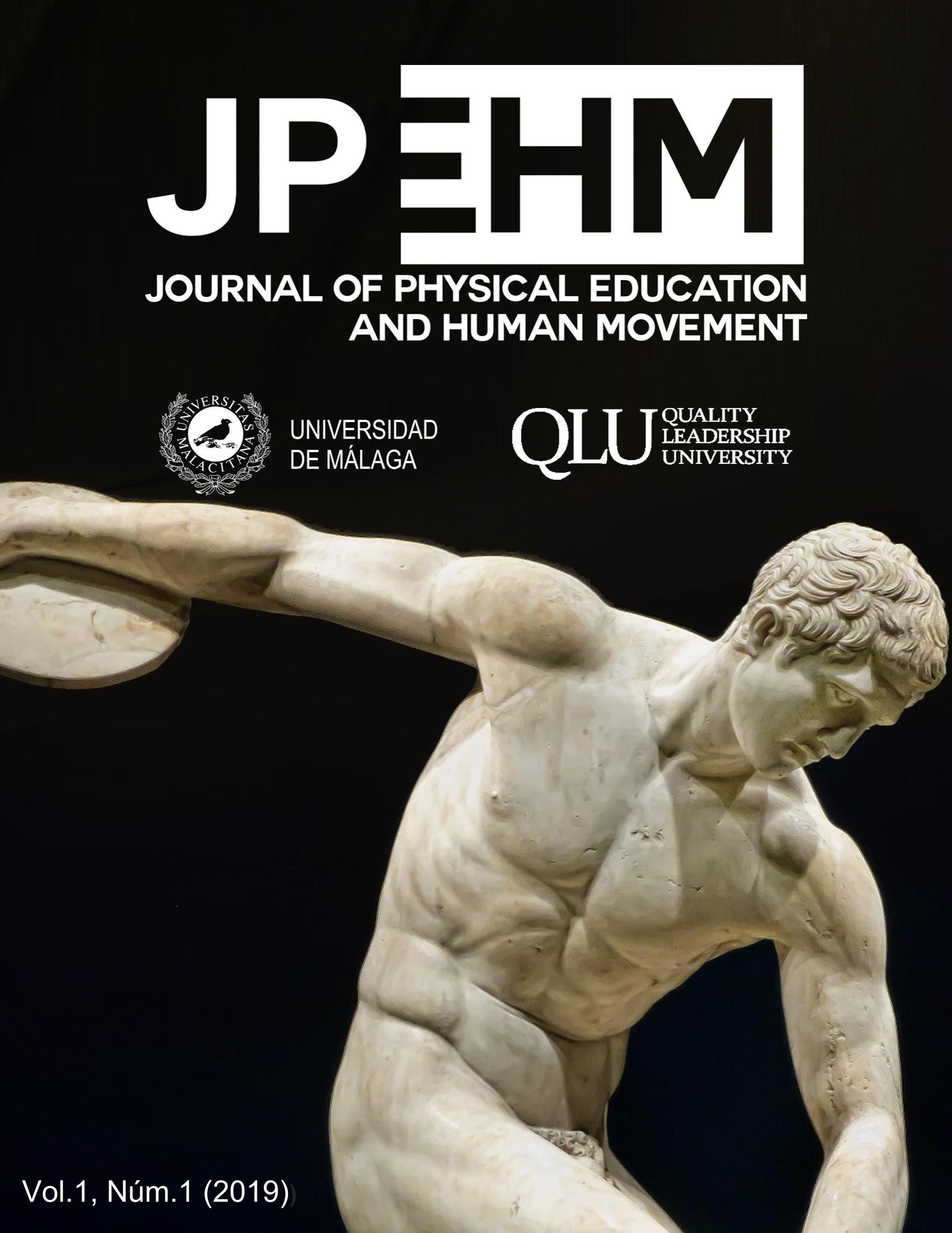PERSONAL AUTONOMY AND PSYCHOMOTOR STATUS IN 3-4 YEAR OLD STUDENTS
DOI:
https://doi.org/10.24310/JPEHMjpehm.v1i1.5495Keywords:
adaptive development, motor skills, skillsAbstract
In the period of Early Childhood Education (0-6 years) it is important that children acquire the necessary skills that allow them to tackle basic tasks such as eating, dressing, cleaning themselves or any other that guarantees a normalized integration in their educational, family and social environment. The present study analyzes different skills related to motor development and its relationship with personal autonomy, in schoolchildren between 3 and 4 years old, within two different contexts, the school classroom and the family home, using a spreadsheet as evaluation tools. direct observation and a survey for relatives. The results obtained on the battery of skills evaluated showed that there are students between 3 and 4 years old with shortcomings in their personal autonomy, below the expected level, especially in tasks related to eating and the execution of simple gestures (dressing, undressing, etc.). , fasten a button) without needing adult supervision. The results indicate that it would be important to include within the psychomotor work in early childhood education, the skills and abilities aimed at enhancing the personal autonomy of children of these ages.
Downloads
Metrics
References
Adolph, K. E., Tamis-LeMonda, C. S., Ishak, S., Karasik, L. B. y Lobo, S. A. (2008). Locomotor experience and use of social information are posture specific. Developmental Psychology, 44 (6), 1705-1714.
Arce, R. y Rivera, J. (1988). Estandarización de una Batería de Escalas de Clasificación de Patrones Básicos Locomotores y Manipulativos para Niños Costarricenses de Edad Preescolar. Universidad de Costa Rica. Tesis de grado.
Campo, L. (2010). Importancia del desarrollo motor en relación con los procesos evolutivos del lenguaje y la cognición en niños de 3 a 7 años de la ciudad de Barranquilla. Salud Uninorte, 26 (1), 65-76.
Cecchini J.A., Fernández, J.L., Pallasá, M. y Cecchini, C. (2012). El proceso de transferencia en el aprendizaje y desarrollo motor. Psicothema, 24 (2), 205-210.
Comellas, M. (2000). Los hábitos de autonomía. Procesos de adquisición. España: Ediciones CEAC.
Despins, J. (2001). La música y el cerebro. Barcelona: Gedisa.
Deval, J. (2006). El desarrollo humano. (7ª Ed). Madrid: siglo XXI editores.
Duek, C. (2010). Infancia, desarrollo y conocimiento: los niños y niñas y su socialización. Revista Latinoamericana de Ciencias Sociales, Niñez y Juventud, 8 (2), 799-808
Fernández de Juan, T. (2008). Educación, música y lateralidad: algunos estudios psicológicos y tratamientos. Enseñanza e Investigación en Psicología, 13 (1), 107-125.
Freedman, A. (1982). Tratado de psiquiatría. La Habana: Editorial Científico Técnica.
Hernández, A. (2006). El subsistema cognitivo en la etapa preescolar. Aquichan, 6 (1), 68-77.
Michell, J. (1997). Quantitative science and the definition of measurement in psychology. British Journal of Psychology, 88, 355-383.
Monge Alvarado, M.A. y Meneses, M. (2002). Instrumentos de evaluación de desarrollo Motor. Revista de Educación, 26 (1), 155-168.
Monsalvo, E. y Guaraná, R. (2008). El valor de la responsabilidad en los niños de educación infantil y su implicación en el desarrollo del comportamiento prosocial. Revista Iberoamericana de Educación, 47 (2).
Morón, C. (2010). La autonomía personal infantil: hábitos higiénicos, alimenticios y de actividad y descanso. Temas Para La educación. Revista Digital para Profesionales de la Enseñanza, 10 Sept.
Newborng, J., Stock, J. y Wnek, L. (1998). Inventario de Desarrollo Battelle. España: Editores TEA
Snow, C. y Mcgana, C. (2003). Infant Development. (3 Ed). New Jersey: Prentice Hall.
Soler, K. M., Rivera, I. R., Figueroa, M., Sánchez, L. y Sánchez, M.C. (2007). Relación entre las características del ambiente psicosocial en el hogar y el desarrollo psicomotor en el niño menor de 36 meses de edad. Boletín Médico Hospital Infantil México, 64, 273 -287.
Zelazo, P. R. (1983). The development of walking: New findings and old assumptions. Journal of Motor Behavior, 15 (2), 99-137.
Downloads
Published
How to Cite
Issue
Section
License
Aquellos autores/as que tengan publicaciones con esta revista, aceptan los términos siguientes:
- Los autores/as conservarán sus derechos de autor y garantizarán a la revista el derecho de primera publicación de su obra, el cuál estará simultáneamente sujeto a la Licencia de reconocimiento de Creative Commons que permite a terceros compartir la obra siempre que se indique su autor y su primera publicación esta revista.
- Los autores/as podrán adoptar otros acuerdos de licencia no exclusiva de distribución de la versión de la obra publicada (p. ej.: depositarla en un archivo telemático institucional o publicarla en un volumen monográfico) siempre que se indique la publicación inicial en esta revista.
- Se permite y recomienda a los autores/as difundir su obra a través de Internet (p. ej.: en archivos telemáticos institucionales o en su página web) antes y durante el proceso de envío, lo cual puede producir intercambios interesantes y aumentar las citas de la obra publicada. (Véase El efecto del acceso abierto).







15.png)
